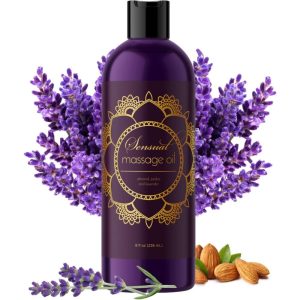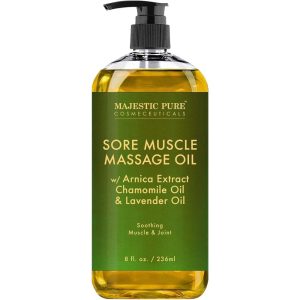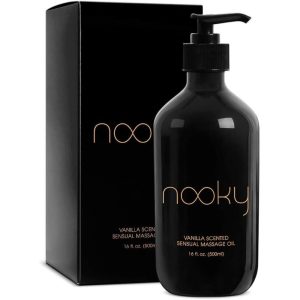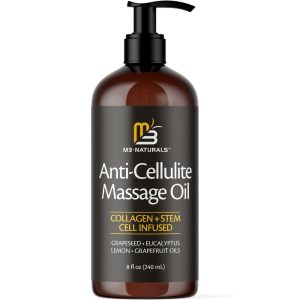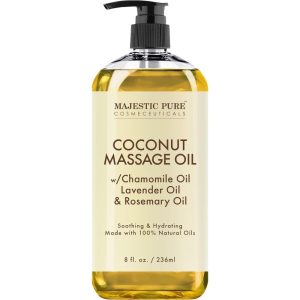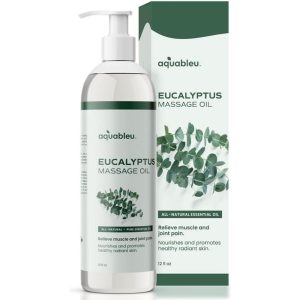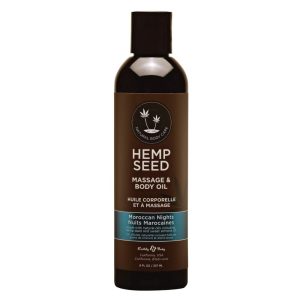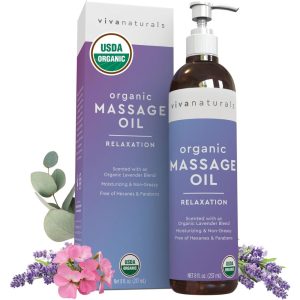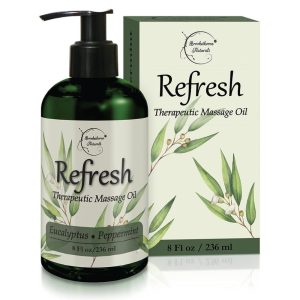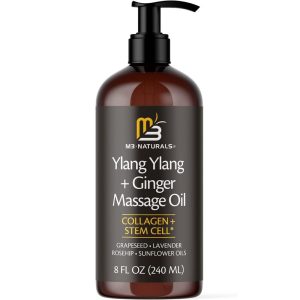Choosing the right massage oil can significantly enhance your relaxation and healing experience. The best massage oils not only nourish the skin but also provide therapeutic benefits, aiding in stress relief and muscle relaxation. With numerous options available, finding the perfect oil for your needs can be a journey of aromatic discovery.
Different oils come with their unique properties and advantages. Whether you’re looking for an oil that provides a slippery glide for deep tissue work or absorbs quickly for a non-greasy finish, there’s an option for you. Let’s explore some top picks to help you create the most soothing and beneficial massage experience.
From the calming scent of lavender to the refreshing aroma of eucalyptus, each oil offers a different path to tranquility. Assessing your personal preferences and skin sensitivities will guide you in selecting an oil that feels great and supports your overall well-being.
Best Massage Oils – The Top 10
1. Lavender Aromatherapy Massage Oil
Lavender Aromatherapy Massage Oil is a popular choice for those seeking relaxation and stress relief. The soothing properties of lavender help to calm the mind and ease tension, making it an excellent option for use in aromatherapy massages. Its gentle aroma is known to promote a sense of peace and well-being.
Perfect for evening massages, this oil can assist in preparing your body and mind for a restful night’s sleep. The natural fragrance of lavender is pleasant and holds therapeutic qualities that enhance the massage experience.
- Soothes stress and promotes a peaceful state of mind
- Ideal for reducing anxiety and restlessness
- Lavender scent enhances relaxation and mental clarity
- Creates a calming atmosphere conducive to well-being
- The lavender scent may be overpowering for some, potentially causing headaches
- Risk of skin irritation for sensitive skin types if not adequately diluted
2. MAJESTIC PURE Arnica Sore Muscle Massage Oil
For those who endure taxing workdays or intense workouts, MAJESTIC PURE Arnica Sore Muscle Massage Oil is a godsend that soothes sore muscles effectively.
Infused with arnica, a time-honored herb known for its natural healing properties, this oil targets muscle and joint pain, offering relief and aiding in recovery.
- Effectively soothes sore muscles post-exercise
- Enhances deep relaxation following physical activities
- Aids in reducing inflammation and discomfort
- Ideal for athletes and physically active individuals
- May cause adverse reactions in individuals with plant sensitivities
- Not suitable for use on broken skin due to the potential for increased irritation
3. Nooky Vanilla Massage Oil
The Nooky Vanilla Massage Oil offers a luxurious and indulgent experience with its rich vanilla scent that delights the senses. This oil is formulated to be silky smooth, providing the perfect glide for a sensual and relaxing massage.
Its hydrating properties ensure that the skin feels soft and pampered, making it an ideal choice for those looking to add a touch of indulgence to their massage routine. The warm and sweet aroma of vanilla can also enhance the overall atmosphere, creating a cozy and inviting environment.
- Decadent vanilla fragrance ideal for massages
- Sets a soothing and intimate ambiance
- Non-greasy texture for a comfortable feel
- Leaves skin moisturized without oiliness
- Fragrance may be too sweet or artificial for some preferences
- The silky texture might not provide enough grip for more profound, therapeutic massage techniques
4. M3 Naturals Anti Cellulite Massage Oil
M3 Naturals Anti Cellulite Massage Oil is crafted with a blend of natural ingredients designed to combat the appearance of cellulite. The invigorating formula not only aids in skin tightening but also stimulates blood flow, contributing to smoother and firmer skin over time.
This massage oil is an excellent choice for those looking for a dual-purpose product that offers both the benefits of a relaxing massage and the added bonus of cellulite reduction. It’s a proactive step towards enhancing skin texture and tone, particularly when used regularly.
- Contains collagen and stem cells for skin rejuvenation
- Improves skin elasticity and texture
- Aids in detoxification and reducing cellulite
- Promotes overall skin health and radiance
- Individual results vary, requiring consistent use
- Possible sensitivity to ingredients; patch test recommended
5. MAJESTIC PURE Coconut Massage Oil
The MAJESTIC PURE Coconut Massage Oil is a versatile option that stands out for its nourishing formula. Enriched with the tropical lavender scent, this oil is lightweight and absorbs quickly into the skin, providing hydration without a greasy residue. The subtle eight fl oz packaging makes it convenient for travel and home use.
Its ability to soothe sore muscles and promote relaxation makes it a fantastic choice for professional and at-home massages. The pleasant lavender scent further enhances the relaxing experience, making it a well-rounded option for those seeking physical and aromatherapeutic benefits.
- Nourishing formula with tropical lavender scent for a soothing experience
- Lightweight and quick absorption provides hydration without greasiness
- Ideal for soothing sore muscles and promoting relaxation
- Convenient eight fl oz packaging, perfect for travel and home use
- Limited to a single scent, which may not appeal to all users
- It may not be suitable for those with coconut oil sensitivities or allergies
6. Aquableu Eucalyptus Massage Oil
Aquableu Eucalyptus Massage Oil is celebrated for its aromatherapeutic properties, offering a revitalizing scent that can enhance your massage experience. Infused with eucalyptus, this oil not only soothes your senses but also contains antibacterial properties that can help cleanse the skin.
Its all-natural blend is tailored to provide a smooth glide without leaving a greasy residue, making it a popular choice for professional and home use.
While it is highly regarded for its refreshing aroma, the oil is also beneficial for those with respiratory issues, as the eucalyptus scent can aid in opening up airways. The blend is carefully crafted to ensure it is gentle on most skin types, and it can be used to help alleviate muscle soreness after a long day.
- Stimulates senses and promotes relaxation with aromatherapy benefits
- Contains antibacterial properties for skin health maintenance
- The non-greasy formula for a comfortable massage experience
- Does not stain clothes or sheets
- The eucalyptus scent may be overpowering for some users
- It is not suitable for all massage types due to its distinct properties
7. Earthly Body Hemp Seed Massage & Body Oil
Earthly Body Hemp Seed Massage & Body Oil is a premium choice for those seeking a rich blend of essential fatty acids and natural moisturizing qualities. Hemp seed oil, the best oil in this all-natural blend, is known for nourishing the skin, leaving it with a healthy glow.
This body massage oil is perfect for targeting dry areas and can even help to reduce the appearance of stretch marks over time.
The oil’s texture is light and absorbs quickly, making it a great body moisturizer for everyday use. Mixed with other natural ingredients like almond oil and vitamin E, it provides a therapeutic experience that aids skin repair and regeneration. The shelf life of this product is also impressive, ensuring that you can enjoy its benefits for an extended period without worrying about it going rancid.
- Rich in essential fatty acids for intense skin hydration
- Long shelf life and effective in minimizing stretch marks
- Cost-effective for regular use
- All-natural blend for a chemical-free experience
- Not suitable for individuals with nut allergies due to almond oil content
- Unique scent may not appeal to all, not ideal for fragrance-free preferences
8. Viva Naturals Organic Massage Oil
Viva Naturals Organic Massage Oil is a luxurious fusion of certified organic ingredients designed to leave your skin soft and hydrated.
Oils like jojoba and apricot kernel oil provide a silky smooth texture easily absorbed by the skin, ensuring a non-greasy feel post-massage. This blend is rich in antioxidants, which help protect the skin from environmental stressors while promoting relaxation and relief from aches and pains.
- Certified organic, free from harmful chemicals and additives
- Rich in antioxidants to protect and rejuvenate skin
- Includes a pump bottle for mess-free application
- Ideal for health-conscious individuals seeking a natural option
- Higher cost compared to other massage oil options
- Contains multiple oils, posing a risk for individuals with specific allergies
9. Refresh Therapeutic Massage Oil
Refresh Therapeutic Massage Oil is designed to offer a deeply soothing massage experience with its blend of natural ingredients. It is particularly effective for easing muscle tension and promoting relaxation.
The oil’s smooth consistency allows easy gliding over the skin without causing any drag, ideal for therapeutic and relaxation massages.
- Effective in relieving aches and pains for a rejuvenating effect
- Refreshing feel during and after use
- Suitable for all skin types, reducing the risk of irritation
- Carefully selected blend of oils for a comfortable massage experience
- The fragrance may be too strong for those seeking scent-free oil
- The formula may not be versatile enough for various massage techniques
10. M3 Naturals Ylang Ylang + Ginger Massage Oil
M3 Naturals Ylang Ylang + Ginger Massage Oil is an exotic and therapeutic choice for those seeking aromatic and physical relief. The combination of ylang-ylang and ginger offers a sensual and warming sensation, making it a popular choice for romantic massages. Its formula is crafted to help soothe tired muscles while the enticing fragrance enhances the massage experience.
Ylang-ylang is known for its mood-enhancing properties, while ginger adds a warming effect that can help with circulation. This massage oil is perfect for a relaxing evening, providing a luxurious and comforting experience that can help to melt away stress and tension.
- Sensual ylang-ylang scent ideal for a great atmosphere
- Warming ginger properties enhance the therapeutic experience
- Soothes sore muscles effectively
- Improves circulation for overall well-being
- The scent combination may be too strong or unappealing for some users
- Warming sensation potentially unsuitable for specific health conditions
Factors to Consider When Choosing the Best Massage Oil
When selecting a massage oil, it’s crucial to consider skin type compatibility, absorption rate, viscosity, and whether the oil provides aromatherapy benefits. Additionally, check for potential allergic reactions, the oil’s shelf life, the massage’s purpose, and any organic or purity considerations. Price and availability might also influence your choice.
Skin Type Compatibility
Understanding your skin type is vital when choosing a massage oil. If you have sensitive skin, look for hypoallergenic options that are less likely to cause irritation. For dry skin, oils that hydrate the skin and have a thicker consistency can provide extra moisture. Conversely, those with oily skin might prefer a lighter oil that won’t clog pores or exacerbate oiliness.
It’s also important to consider if the oil could cause an adverse reaction. For example, individuals with nut allergies should avoid oils derived from nuts. Always perform a patch test to ensure the oil won’t irritate your skin before applying it to larger areas.
Absorption Rate
The rate at which an oil is absorbed into the skin should be considered, as it affects the massage’s effectiveness and the skin’s overall feel. Heavier oils may provide a longer glide but can leave a residue, while lighter oils absorb quickly and might require more frequent reapplication. The absorption also impacts how well the oil hydrates the skin.
Besides personal preference, the absorption rate can also impact the massage’s therapeutic aspects. For instance, if you’re looking for a massage that leaves skin and the hands feeling nourished without a greasy after-feel, a medium-absorption oil might strike the perfect balance between glide and nourishment.
Viscosity and Texture
The viscosity and texture of a massage oil can significantly affect the massage experience. Thicker, more viscous oils tend to provide a longer-lasting glide, which is beneficial for longer massage sessions. However, they may also be harder to wash off and could leave a residue on skin and sheets. Organic massage oil options often have a luxurious texture, offering a compromise between slip and absorption.
For those preferring a lighter touch, oils with a lower viscosity, such as Viva Naturals Organic Massage Oil, are a good choice. These oils absorb more quickly, allowing for a less intense glide that is preferable for more sensitive areas or clients who might feel uncomfortable with heavy oils.
Aromatherapy Benefits
Aromatherapy plays an essential role in the overall massage experience. Certain oil blends can evoke relaxation, reduce stress, or even invigorate the senses. When selecting an oil for aromatherapy purposes, consider the desired outcome of the massage. For a calming effect, lavender is a popular choice, while citrus oils can uplift and energize.
It’s also important to consider if you have sensitive skin, as some essential oils can be too potent and cause irritation. Look for blends specifically formulated for sensitive skin or a full-body massage that balances therapeutic benefits with gentle ingredients.
Allergic Reactions
Allergic reactions to massage oils can vary from mild to severe, including symptoms like redness, itching, or swelling. It’s imperative to know the ingredients in massage oil and whether they pose any risk of an allergic response. Be particularly cautious with oils that contain nuts, soy, or other common allergens.
Always inquire about allergies before using a new oil on a client, and consider having a selection of hypoallergenic oils available. For personal use, conducting a patch test on a small skin area before full application can help prevent any unexpected allergic reactions.
Shelf Life and Stability
Massage oils’ shelf life and stability are important for safety and efficacy. Oils can go rancid over time, which may affect their smell, texture, and therapeutic properties. Check the expiration date before purchase and store oils properly in a cool, dark place to extend their shelf life.
Some oils, like organic jojoba oil, are known for their longer shelf life due to their stability. Choosing an oil with natural preservatives or antioxidants can also help ensure that it remains fresh and beneficial for as long as possible.
Purpose of the Massage
The intended purpose of the massage—whether for relaxation, muscle pain relief, or skin conditioning—will influence your choice of oil. For relaxing massages, oils with calming scents like lavender or chamomile are beneficial. For muscle relief, look for oils that incorporate ingredients known for their soothing properties, such as arnica or peppermint oil.
If the massage aims at skin conditioning, oils rich in vitamins and antioxidants, like argan oil, can provide additional benefits. It’s crucial to align the oil’s properties with the massage’s goals to maximize effectiveness.
Organic and Purity Considerations
Organic oils are preferred by many due to their lack of pesticides and chemicals, which can be better for both the environment and your skin. When looking for organic options, certifications like USDA Organic can assure you of the oil’s purity. Organic jojoba oil, for example, is a versatile option that’s gentle and nourishing for most skin types.
Purity also matters, as oils with additives or synthetic fragrances can reduce the therapeutic benefits and potentially cause skin irritation. Pure oils often provide a more authentic and potent experience in terms of massage and aromatherapy benefits.
Price and Availability
The cost of massage oils can vary widely based on the type of oil, brand, and purity. While higher-priced oils often offer better quality and aromatherapy benefits, budget-friendly options can also be effective, especially for those who use massage oil regularly. Balancing quality with affordability is key.
Availability is another consideration. Some specialty oils may only be available online or in certain stores, which can be inconvenient. Look for oils that are easily accessible so you can replenish your supply as needed without hassle.
Carrier Oils and Essential Oils Blending
Blending carrier oils with essential oils allows for a customized massage experience. Carrier oils dilute the potent essential oils, making them safe for skin application. For sensitive skin, choosing a mild carrier oil like sweet almond or coconut oil can minimize the risk of irritation.
When blending, consider the properties of each oil. Some carrier oils have a more neutral scent and won’t overpower the essential oils’ fragrance, while others might offer additional skin benefits. The right blend can enhance the therapeutic effects of a massage and provide a more personalized approach to wellness.
Frequently Asked Questions
1. What are the top massage oils recommended for sensitive skin?
For those with sensitive skin, the best massage oils are those that are gentle and free of potential irritants. Hypoallergenic oils, or those specifically formulated for sensitive skin, can be excellent choices. Look for oils that do not contain additives, synthetic fragrances, or common allergens like nut-derived oils. While refreshing, peppermint oil can be too intense for some, so it should be used cautiously and diluted properly. For those with nut allergies, consider alternatives like sunflower or grapeseed oil.
2. How do different types of massage oils affect the skin’s absorption rate?
The absorption rate of massage oils into the skin can vary greatly depending on their composition. Oils derived from the jojoba plant closely mimic the skin’s natural sebum, facilitating easy absorption without leaving a greasy residue. Conversely, thicker oils like cocoa butter tend to form a protective layer on the skin barrier, slowing absorption down. Choosing an oil that absorbs well ensures that the skin and nervous system benefit from the therapeutic properties without compromising the skin’s natural balance.
3. Can certain massage oils help with muscle relief, and if so, which ones are most effective?
Yes, certain massage oils can significantly aid in muscle relief. Oils infused with arnica extract are renowned for their anti-inflammatory properties, offering pain relief and aiding in the recovery of sore muscles. Similarly, with its warming effect, ginger oil can soothe muscle aches and reduce stiffness. For pure organic options, look for oils that blend these extracts with a carrier oil to ensure maximum effectiveness and skin compatibility.
4. What should I look for in a massage oil if I want to use it for aromatherapy purposes?
When selecting a massage oil for aromatherapy, consider oils that have both therapeutic and olfactory benefits. Essential oils like lavender and sweet orange provide a calming scent that can soothe the nervous system and offer skin benefits. Look for blends that maintain purity and potency, ensuring that the essential oils are not diluted beyond effectiveness. Pure organic oils are often preferred because they lack synthetic additives, which may alter the desired aromatherapeutic impact.
5. Are any specific massage oils better suited for deep-tissue massage techniques?
For deep tissue massage, the best massage oils on the market balance glide and friction. While lighter oils like sweet almond or grape seed oil are ideal for Swedish massage, deep tissue techniques benefit from oils with more grip, such as olive oil, which has a slower absorption rate, allowing for the sustained pressure required. Essential oils such as rosemary and lavender can be added for pain relief and to enhance the overall health and wellness experience. Always warm oil to room temperature for improved absorption and to prevent skin irritation.
6. Is it safe to use massage oil if I have skin conditions like eczema or psoriasis?
It’s important to choose massage oils that are gentle and hypoallergenic if you have skin conditions like eczema or psoriasis. Oils with anti-inflammatory properties, such as coconut oil or shea butter, can be soothing. However, doing a patch test and consulting a dermatologist is crucial, as each individual’s skin may react differently.
How can I determine if a massage oil is high quality and pure?
High-quality, pure massage oils are often labeled as “cold-pressed,” “organic,” or “100% pure.” These oils are free from additives and preservatives. Checking for certifications such as USDA Organic or Non-GMO Project Verified can also be a good indicator. Additionally, high-quality oils usually come in dark bottles to protect them from light damage and have a natural, distinct aroma.
7. Are any massage oils particularly good for stress relief and relaxation?
Yes, certain oils are known for their stress-relieving properties. Lavender oil is widely recognized for its calming and relaxing effects. Chamomile oil is also a great choice for stress relief due to its soothing properties. For a more stimulating effect to help alleviate stress, consider citrus-based oils like bergamot or sweet orange. These oils can be used alone or blended with a carrier oil for a more nuanced aroma and therapeutic effect.
Conclusion
Choosing the right massage oil is essential for enhancing your massage experience. Whether you prefer the calming scent of lavender or the soothing properties of pure arnica sore muscle massage oil, the options are plentiful. For those with muscle discomfort, the majestic pure arnica sore muscle massage is a standout choice. While every oil has unique benefits and potential drawbacks, personal preferences, and specific needs will guide your decision. Remember to consider factors like skin type, absorption, and aroma when selecting an oil that will provide the greatest benefit and pleasure in your massage routine.

